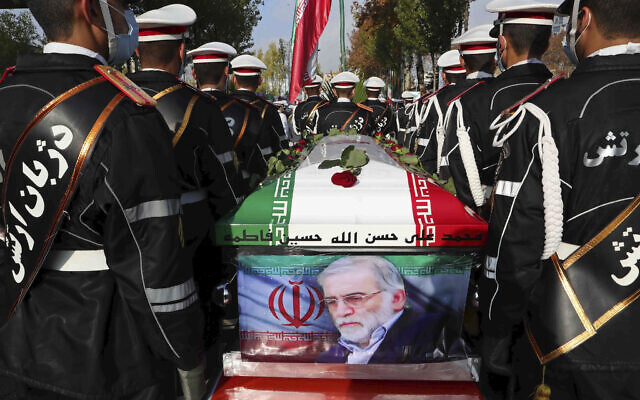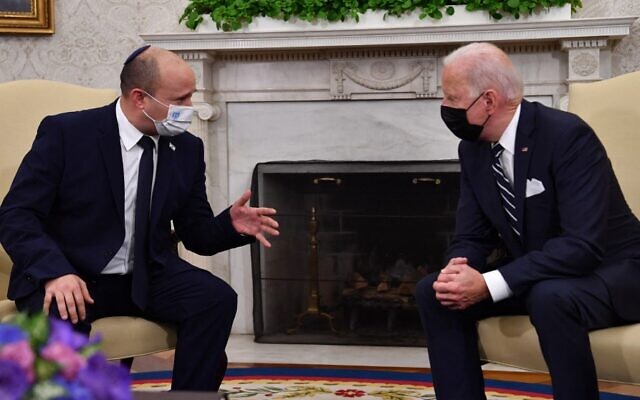As nuclear talks resume in Vienna, official says Israel pushing for ‘upgraded agreement’ to restrict Tehran’s nuclear program along with development of ‘significant attack plan’

Israel’s alleged assassination of top Iranian nuclear scientist Mohsen Fakhrizadeh did not have the desired effect of slowing down Iran’s nuclear work, an official told Israeli television on Tuesday.
“The killing of Fakhrizadeh a year ago did not brake Iran’s progress as was hoped,” the anonymous Israeli official was quoted as saying by Channel 12 news. “The current situation is the most advanced that Iran has ever reached.”
Therefore, the official added, “there is a huge global Israeli effort — both publicly and behind the scenes — to push for an upgraded agreement as well as simultaneously building a large and significant attack plan.”
Fakhrizadeh, identified by Israel as the father of Iran’s rogue nuclear weapons program, was assassinated last year in a sophisticated hit reportedly led by a Mossad team.
Iran has accused Israel of carrying out the hit and threatened revenge. Israel has not publicly commented on the allegation that it was responsible, though former Mossad chief Yossi Cohen confirmed earlier this year that Fakhrizadeh was long in the spy agency’s sights.
The report came a week after The New York Times quoted United States officials as saying that they warned Israel that its attacks against the Iranian nuclear program were counterproductive and have enabled Tehran to rebuild an even more efficient enrichment system.
The unnamed official spoke a day after the resumption of negotiations between Iran and world powers to restore the 2015 nuclear deal, which kicked off in Vienna after a nearly six-month suspension in talks.
The US — which pulled out of the deal under former president Donald Trump — is only participating indirectly in the negotiations.

Israel vocally opposed the 2015 agreement, and Israeli officials now say Iran is closer than ever to developing nuclear arms. Israeli leaders have called for a tough line on the Islamic Republic in the nuclear talks, with Prime Minister Naftali Bennett urging world powers not to “give in to Iran’s nuclear blackmail.”
Senior officials quoted by Channel 12 said the worst-case scenario for Israel would be that sanctions are lifted on Iran without an agreement restricting its nuclear program. The officials predicted that in such a case, Iran could reach a point where it has the capability to produce a nuclear bomb in six months.
“Then Israel would have no choice but to take its destiny into its own hands,” the officials said.
Without citing a source, the network also reported that Israel was increasing the amount of intelligence on Iran’s nuclear activities it shares with world powers.
On Monday, Axios reported that Israel has been sharing intelligence with the US showing that Iran is “taking technical steps to prepare to enrich uranium” to 90 percent purity, which is considered weapons-grade. The preparations could enable Tehran to reach weapons-grade levels within just a few weeks, Axios reported, citing two US sources briefed on the matter.
Israel was also reportedly pressing to ensure any deal will not allow Iran to enrich uranium, keep advanced centrifuges or leave Tehran with the ability to develop nuclear weapons, Channel 12 reported Tuesday.
According to Channel 12, Israel was concerned by the US stance toward Iran, feeling it was not firm enough, and was worried that America was not demonstrating sufficient military strength in the Persian Gulf.

Earlier Tuesday, Foreign Minister Yair Lapid told French President Emmanuel Macron that Israel opposes removing sanctions on Iran and that only a credible military threat will stop Tehran’s nuclear program
Meeting with Macron in Paris, Lapid said Israel believes Iran is merely buying time at the talks in order to continue making progress in its nuclear program, and to gain relief from crippling economic sanctions. Israel’s top diplomat also emphasized the need to develop an effective Plan B if talks fail.
Lapid’s talk with Macron came a day after the French leader spoke with Iranian President Ebrahim Raisi, who demanded the lifting of sanctions as a first step to reentering the nuclear deal.
The Biden administration has repeatedly said that it would only lift sanctions in return for concrete and evident changes in Iran’s behavior, and that not all sanctions would be lifted.
As reported by The Times of Israel
